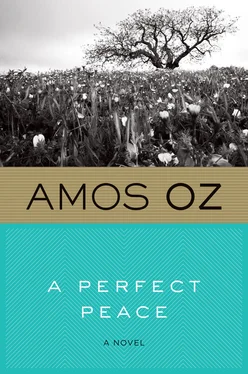In the metal shop a barefoot Bolognesi donned his welder's mask and set to work repairing chicken cages. Sparks flew in all directions. "By day'a drought consume'a me an' frost by night," he mumbled.
Etan R. had made some far-reaching changes in the cowshed. Now that stubborn Stutchnik was gone at last and there was no one to stand in the way of progress, he lost no time in streamlining the operation. Both his girlfriends worked alongside him, and the lunacy of the late-night milking had been relegated to the dustbin of history. The three of them now began the milking at the eminently civilized hour of nine p.m. On finishing around twelve, they would go for a starlit dip in the pool, open a bottle of wine, and let nature take its course.
Finally yielding to suasion, Yashek had agreed to take over Srulik's old job as bookkeeper. Since it was off-season in the citrus groves, Udi Shneour was once again working in the grain fields, swearing he would straighten out the mess come hell or high water. His wife Anat was due in December.
From time to time the two of them would have Azariah and Rimona, who also expected to give birth in early winter, over for Turkish coffee with cardamom. Udi still enjoyed talking about past and future wars. Azariah had a penchant for politics — Nasser's trouble in Yemen, the dilemmas facing King Hussein, the blindness of Eshkol and his cabinet — and for the dark labyrinths of the Russian soul. Azariah was no longer the object of snickers behind his back. He had learned the art of pausing for effect between one sentence and the next and of making people laugh when he wanted them to. He had also mastered the trick of interrupting himself with an unexpected rhetorical question, the unconventionality of which tended to make his audience feel it was considering the subject without prejudice for the first time.
Azariah had long since given up strutting about in cuffed gabardine slacks, haunting the high-school girls' dorm, boasting of telepathic and telekinetic powers, and exasperating Srulik with his feverish confessions of undying love. Upon leaving the dining hall after supper he would put an arm around Rimona's waist, his green eyes glinting with the unspoken arrogance of a male who has taken another male's female and might do it again any time he wants. At last all could see who he really was. And they had seen nothing yet. The day would come when only historians would recall Yolek Lifshitz, but every child in the land would know that Kibbutz Granot was the home of Azariah Gitlin. Gitlin? Shouldn't he perhaps adopt a more Hebrew-sounding name, like Gat or Geytal?
These days he was in consistently high spirits. After putting in fourteen hours in the tractor shed, he still managed to find time to be with Rimona, to socialize, to help out Hava, tc play the guitar, to chat with Srulik, to bone up on professional literature, to improve his chess, to keep up with world and national affairs, to crack a book of poetry, and even, now and then, to take yet another peek at Spinoza.
Azariah had grown tan. The summer sun had singed his light head of hair, which had grown longer since his arrival last winter, when it was short as a hedgehog's. A scar on his chin courtesy of some red-hot engine oil had given him a no-nonsense look. Come August, he promised himself, he would learn to swim and take driving lessons.
He had even become a source of comfort to others. One day, with tears in her eyes, Anat accosted him in the tractor shed and begged for a private talk. Azariah took her aside to the very spot behind the hayloft where, many years previously, a maniac had fired his revolver at everything in sight. She could not go on living like this any longer, she said. Udi had become an animal. Now that she was pregnant he was spending every night with Etan and his two whores in the swimming pool and not coming home until three in the morning.
Azariah recalled how this same tearful young woman had once taken cold-blooded pleasure in teasing him, in making him play peekaboo with the hem of her dress and her neckline, in driving him half out of his mind with the foul torments of lust.
He put his hand gently on the nape of her neck, overcame a momentary hesitation, and reminded her of all this. Not letting himself be flustered by her blushes, he proceeded to speak about the recalcitrance of the flesh, how it was different with men, far removed at times from any emotion, piercing, almost like pain. He tried to explain to her that Udi was still partly a child and that all his boastful war stories, his bravado about killing and death, and his deliberate coarseness came from the same inner fear of being tender or soft. When Anat's eyes overflowed and she begged him to tell her what to do — look the other way? quarrel? move out? — Azariah only said, Anat, you know he is frightened, try to help him not to be, only don't ask me how, because you are the one who knows him. She went on crying for at least ten minutes while Azariah stood there, holding her by the arm until she felt better.
Now and then he would have a chat with Hava too, often talking about his childhood. For some reason he felt the need to tell her things he had never been able, or wanted, to disclose to Yoni, Yolek, Srulik, or even Rimona. About the hungry years on the run in the forests, villages, and snows of Russia, about the freight trains all the way across the Urals, about the filthy cities of Asia and their sweltering steppes. About having no parents. About the horrid old aunt who tyrannized him until she went out of her mind in an immigrants' camp in Israel. About his years in the army that failed to break him, though he had been humiliated and picked on, because from the time he was little he had believed he had a mission. And about how the winter night he had arrived, Yolek had been so caring toward him, and you, Hava, took me for the first time to the dining hall, and then Yoni came to take me to work the next morning. It made Yoni angry to be told that there was no choice, and angry too that nothing ever happened here, so that one day was just like the next. He used to talk to me about setting out for Bangkok or Karachi, places like that, and couldn't believe that I was happy to stay put and live in one place. He even laughed at me for being that way and once he almost hit me, but we are brothers all the same. Whenever she asked him where he thought Yonatan was, Azariah could only tell her that Yoni had been unhappy and had gone away to be by himself and perhaps to punish everybody else.
"Oh, you can talk, all right," Hava would say, with more wistfulness than malice, and pour him a cold soda to drink.
One evening she asked him to play something on his guitar for them, because it would make Yolek happy. Azariah complied with the haunting melody to Tshernichovsky's "Play, Play Upon My Dreams," but Yolek gave no sign of hearing a note. Later, Srulik dropped by to say good evening, and when the two men left together, he asked Azariah to serve as an instructor in the summer work camp for city youth. Although Azariah was thrilled, he protested that he had too much work to do already and forced Srulik to take a good five minutes to convince him. That same evening, having found a broken old fan in Etan R.'s room, he took it apart, repaired and reassembled it, and, before going to bed, carried it over to Bolognesi, whose low-ceilinged room was stifling on these hot nights.
Summarizing the day's events, Srulik wrote in his journal:
There is apparently no social or political remedy for the simplest, most common suffering. One can try to do away with the master-slave relationship in the outward, material realms. One can put an end to hunger, bloodshed, and the grosser forms of cruelty. I am proud of the fact that we have fought to accomplish these things and have proved that the battle is not hopeless. So far, so good. But that's where the trouble begins.
Читать дальше












